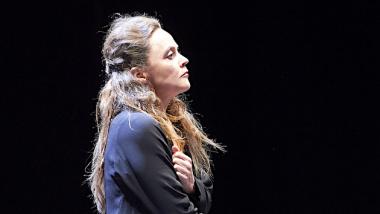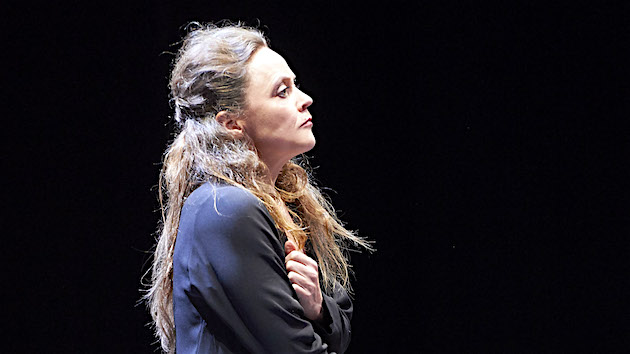
Anyone who has witnessed a live performance by soprano Evelyn Herlitzius or seen her on DVD is likely to come away with at least one common impression of her: intensity. A fierce and committed stage presence, Herlitzius also wields her agile voice and silvery tone with apparent abandon.
For more than two decades Herlitzius has earned acclaim in many of opera’s most demanding roles — Elektra, the Dyer’s Wife, Brünnhilde, Kundry, Isolde, Katerina Ismailova, Turandot —on Europe’s leading stages. Her portrayal of Brünnhilde, the heroine at the heart of Wagner’s four-part Der Ring des Nibelungen, has thrilled opera lovers at theaters including the Festpielhaus in Bayreuth, Dresden’s Semper Oper, Deutsche Oper Berlin, and the Vienna State Opera. But until recently, a trip abroad was the only way to catch Herlitzius in person.
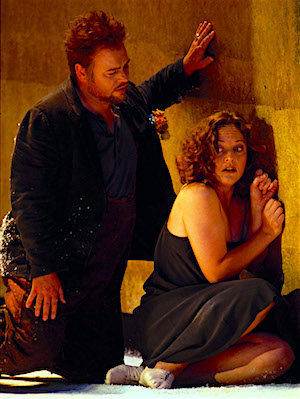
Fortunately for American audiences this is beginning to change. Since 2009, Herlitzius has appeared twice in concert at New York’s Carnegie Hall and two months ago she made her long-awaited American staged opera debut at the Metropolitan Opera as Kundry in Wagner’s Parsifal. This summer, Herlitzius brings her acclaimed Brünnhilde to San Francisco Opera in three complete Rings cycles at the War Memorial Opera House from June 12 to July 1.
I met with Herlitzius to talk about her upcoming San Francisco Opera debut. We began our conversation deep below the Metropolitan Opera House in in the Company’s Archives amid evocative Ring-related artifacts, including a statue of tenor Jean de Reszke as Siegfried, the Brünnhilde costume worn by Kirsten Flagstad in both New York and San Francisco during the 1930s, and, at Herlitzius’ request, a stack of photos of her favorite, German soprano Frida Leider. Buoyant and quick to laugh, even after performing in the marathon-like Parsifal the night before, Evelyn Herlitzius brought thoughtful introspection and her accustomed intensity to our conversation.
Last night’s Parsifal performance was sensational. After giving so much emotion and energy on stage, how are you doing today?
I’m tired, of course. I couldn’t sleep until five in the morning last night because of the adrenaline flowing in my body. Right now, I am a little beneath myself, but it comes back by 5 p.m. I usually need lots of coffee.
You have performed both Erwartung and Wozzeck at Carnegie Hall, but this is your first time performing in United States for a much longer period.
Yes, it’s my first time being here for more than three days.
So what do you think of New York? Have you gotten the hang of the city?
It took me some time to become accustomed to its velocity and the noise. During the first two weeks I was here, I just went straight to the rehearsal at the opera house and back. It was just too much. But then I started to explore a little bit.
How did you begin this career path to becoming a singing actress?
Originally I intended to become a dancer. From the age of five I was interested in dance and theater and began studying. At around 16 years old, I began singing lessons, but not to become a singer at all. I wasn’t fond of opera, I must confess, but I thought it would be an advantage to be able to sing and to dance. After I quit dancing, my teacher said you’ve got the voice and the musicality, why don’t you give this a try. I did and that’s why I’m here.
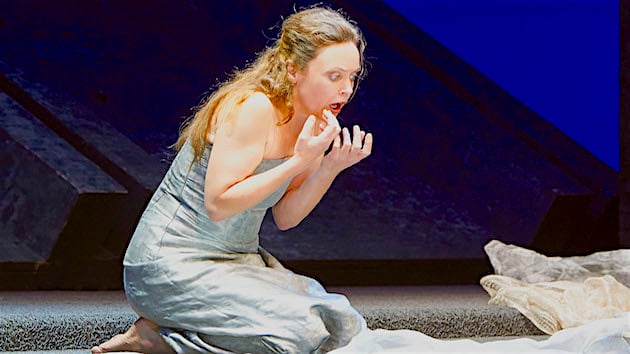
Did you play an instrument?
As a child I had piano lessons. I was like a cuckoo child in my family because they were not artists; I was the only one.
Did they support your interest in becoming a singer?
In the beginning I didn’t tell anyone. I wanted to be completely independent. At first I tried to get an engagement as a chorus singer. I went to an agent to sing and he told me: “okay, it wasn’t so bad.” I was very surprised to hear that. He gave me a list of theaters with vacancies and told me to just go and audition. The first was in the place where I was staying and the chorus master wanted to give me a contract, but one of the conductors of the house, who was also my piano teacher, was there and he prevented them. At our next piano lesson, he told me and I was so offended. But he told me I should go to university and work on my voice which was not ready for the demanding job of a chorus singer. I am very grateful now because it would have been exhausting. So, I made an audition at the university in Hamburg and started my studies there.
Was there any one person that helped steer your development?
Yes, my first singing teacher. She was always really engaging me and giving me support. We are still in contact. In Hamburg there was my second teacher. Also, my first husband who was a student there. And there was also a teacher, a pianist for lieder, who first encouraged me to change my repertoire.
What had you been singing?
Lyric repertoire. It didn’t really work. After a few years he encouraged me to go ahead and try something else and that was really helpful. At the time, I was struggling and thinking about giving it up.
Was there any one repertory choice that when you found it you realized that you were in the right place vocally?
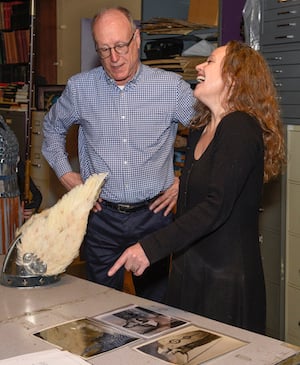
When I first sang Elisabeth in Tannhäuser it felt so right. And also with Tatiana [in Eugene Onegin]. I never sang it on stage, but those long phrases and being so settled in the middle register felt comfortable. But when I made my audition I sang Blondchen [Mozart’s Die Entführung aus dem Serail], Bartered Bride (which is totally different, of course), and I sang a piece by Luciano Berio called Stripsody. It was written for Cathy Berberian and you have to use your voice to illustrate a comic strip. One of the instructors asked me if I would like to sing Orpheus, too. I said, “Oh, I would very much like to sing Orpheus for you!” I would have been capable, of course, because my voice had a very wide range and I adored Orpheus. It was my favorite opera—it’s still my favorite—and I knew it by heart, but the teacher was making a joke. I was just so inexperienced about singing and repertoire that I didn’t understand it was a joke. In the end, everyone was insecure about what to do with me. They said “Herlitzius can sing anything,” but that wasn’t really helpful.
When I began auditioning with theaters they didn’t know what to do with me either. One theater said I should be a lyric soprano while another said I was a mezzo. So I sang Fiordiligi [in Così fan tutte] in my audition and they offered me Octavian [in Der Rosenkavalier]! The next theater suggested that I try to sing Pamina in Die Zauberflöte. I was so desperate that I lost my confidence and couldn’t sing anything. But then I worked with my teachers on changing my repertoire.
This is when you found Elizabeth in Tannhäuser?
Yes. It took me another three or four years to make changes in my technique and in the way I thought about things. The most important thing is bringing the inner ear and your feelings about yourself in accordance with your voice. I think that is the biggest challenge.
These works of Wagner and Strauss that you sing are so psychologically involved and there is so much depth to the characters.
Yes. And it never stops! The plots and everything around them are so rich that I still discover new things in them. I’ve been singing Kundry [in Parsifal] now for 15 years or so, but I’m still surprised.
What about Brünnhilde in the Ring? There you have three big operas to master for one character.
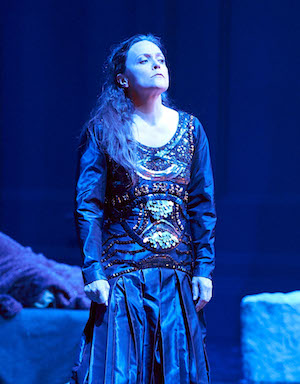
It the same; a neverending story. I think the most interesting thing about Brünnhilde is that you have this development over three different operas. It’s about a 16-year-old girl who changes and by the end is a wise woman who knows a lot about mankind and the world and is able to forgive in the end.
Brünnhilde has such strong shoulders to take this on. Are you that woman? Do you identify with her journey?
I don’t know if I’m that woman or not. I am an actor [laughs]. You just have to explore those feelings the figure might have. These feelings are in all of us. We’ve experienced hate, desperation, love, and joy. You just have to clearly find out what is going on with this person in this very moment and explore it in your own soul and in your heart.
Your first Ring was in Münster and you have done many productions since then. How does Brünnhilde change for you each time?
Hopefully I have developed this role and found new aspects, but I was very lucky and am very grateful that the first production I did in Münster was so convincing and clear. The director was very aware of the psychological and historical aspects of the Ring and we were in discussions about that often. The performances were split over two years, so I was able to sing Walküre and then have the time to study Siegfried and Götterdämmerung. The colleagues were great, too. I think it was an ideal case for a beginner. Münster is not a big house, but there was attentiveness because, with Wagner, of course some people can become somewhat mad. But it wasn’t Munich or Hamburg, so that experience for me was quieter and a safer place. I still go back to this production in thinking about the Ring.
I am always making notes in my scores and I save them. When there are so many notes that you can’t read the notes anymore, it’s time to buy a new score. I think I have four Walküres now. But I keep them all because they are helpful. For example, in Walküre the first dialogue with Wotan is very demanding for Brünnhilde because Wotan is singing the whole time and you need to stand there and react. All she has believed in to that point comes crashing down. The challenge is how to play that.
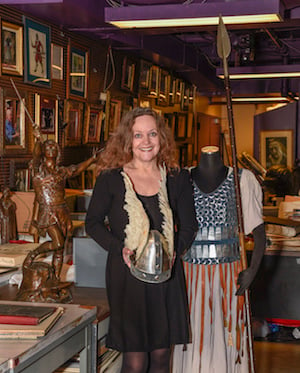
When I am singing the Siegfried Brünnhilde, I am always going back to my first score. It’s still interesting to read what I thought 20 years ago and what we found out there about the psychological aspect of this relationship with Siegfried. Why is Brünnhilde so shy and behaving like this? She has given up so much at the end of the previous opera and she is giving up much more in this relationship with Siegfried.
She gives up her status as a goddess.
But what I find so interesting is that she has given up her status, but not her knowledge. She is aware of everything. The only time when she is not aware of her past stature is in Act II of Götterdämmerung when she realizes Siegfried’s unfaithfulness. She is no longer aware of her wisdom as a goddess; she is a woman. Maybe it’s because of her fury, but she has ... like a blackout. Hmmm... that’s very interesting [laughs].
As a performer, what is going through your mind at the end of Walküre when Wotan puts Brünnhilde to sleep? Are you still in character?
I’m lying there, listening to this incredible music. I’m still in character, but I’m allowed to enjoy the music.
How about in Siegfried? You begin the opera asleep, but once you awake there is so much to sing.
That’s really hard because you’re lying there for 10 or 12 minutes, knowing that you will have to start with “Heil dir, Sonne.” But the music supports it because it is so strong and glorious.
When I was in Bayreuth, I was lying there in Siegfried and the sound was sweeping toward the stage and then out toward the audience; it’s a special phenomenon and it creates a mixture: that famous Bayreuth sound. There is this moment in the violas where the conductor, Adam Fischer, asked the viola players to change their bows just in this place and not use a modern bow. It changed the sound completely. It brought me to tears every performance. I’ve never heard that again. The sound was so soft. I can’t describe it, really.
When you perform in the Ring are you striving for a perfect performance or is each time like a new journey and you will just see where it takes you?
Well, it can never be perfect. It’s too challenging. I would say it is my goal — not just with the Ring but every time I’m onstage — to forget about technique and just be completely in the moment. It’s really hard to achieve, because it’s too demanding and it can be dangerous to let go of vocal control. But to find this tiny path of equality between control and freedom ... that’s my goal.
I once achieved one of those moments in a production of Wozzeck. My Wozzeck was an animal onstage; he was wonderful. In the street scene, there is a quarrel between Wozzeck and Marie and he was supposed to throw me against the wall. We were both totally in this emotion and he really slammed me. I was 10 centimeters from falling into the pit. I think we both managed to be good with our voices, which is difficult in this scene and you have to be aware not to hurt yourself with the speak-singing, and we were really together with the conductor. This kind of energy and truth onstage is so rare. It’s not repeatable.
When Kirsten Flagstad performed in the Ring at the Met and San Francisco Opera during the 1930s, the productions were very naturalistic; the tree in Act I of Walküre is actually supposed to be a tree.
That’s very unusual [laughs]!
The Ring productions you have performed in Europe are quite different. Does that approach interest you or is it more engaging when the settings are reimagined?
In the end, I don’t think it’s important whether there is a tree or not, but that the interactions between the characters are clear. That is what is special about Wagner — these works are ageless. They are different from those of Puccini for instance where the opera is so combined with a place and time. That’s very complicated for us nowadays to show in a modern way.
In San Francisco you will be collaborating with Donald Runnicles with whom you have often worked in Berlin. How do you feel about making your debut in this Ring staging by Francesca Zambello with him on the podium?
We have done the Ring several times together. I’m looking forward to the fact that we know each other and trust each other. I know I can rely on him in every moment on stage and he knows that about me.
Do you have a favorite food?
Fried eggs. And sunflower seeds! I’m addicted to them and always eating them like a bird.
What is your favorite music to listen to?
Mendelssohn, especially the piano trios. And Bach, of course. His French Suites and all of the chamber music.
What is the perfect vacation?
The North Sea during a hot summer and nobody there! It’s so wonderful with the breeze, the waves, and the water is not too cold yet still refreshing.
If you were not a singer, what would you be doing today?
Hmmm, interesting question. Having eight children instead of two, perhaps. I always wanted to become a sculptor. Also, a gardener.
Have you ever thought about directing opera?
Yes, but that’s for later. You can’t sing and direct at the same time.

